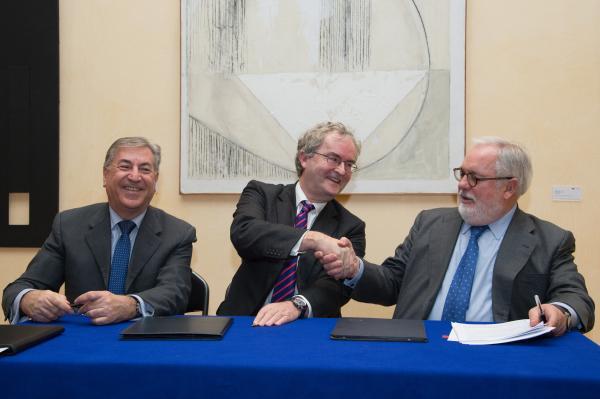
Two new financial instruments that aim to encourage greater private sector involvement in schemes that contribute to the twin climate priorities of reducing energy use and conserving natural capital, especially biodiversity, in Europe will be later launched today. The EIB and European Commission have joined forces to back investment through these two initiatives that support Europe’s contribution to achieving global energy, climate and environmental goals.
The Private Finance for Energy Efficiency and Natural Capital Financing Facility schemes will be formally launched in Brussels by Jonathan Taylor, European Investment Bank Vice President responsible for climate action and energy, Miguel Arias Cañete, European Commissioner for Climate Action and Energy and Karmenu Vella, European Commissioner for Environment, Maritime Affairs and Fisheries, and representatives of a range of environmental groups.“Enabling broader private sector involvement in climate finance and investment in natural capital projects is essential to tackle challenges of this scale and the European Investment Bank is committed to supporting climate action and environmental sustainability. We welcome the opportunity to contribute both technical expertise and financial support to increase investment in energy efficiency and natural capital through the two initiatives being launched today. These will help financial institutions and other investors to increase their role and contribute to improving specialist understanding essential for the financing of viable projects in these areas.” said Jonathan Taylor, European Investment Bank Vice President responsible for climate action and energy.
"With these new financial instruments, we are putting the money where it matters. The new instruments will unlock significant public and private investment in key strategic areas like energy efficiency and climate protection. This is a contribution to protecting the climate, saving energy for our citizens and making Europe less dependent on imported energy. This is what building an Energy Union is all about," said Miguel Arias Cañete, European Commissioner for Climate Action and Energy.
“To protect the diversity of our natural surroundings we need to promote the diversity of our funding sources. The Natural Capital Financing Facility is a new EU funding source that helps businesses to protect nature and adapt to climate change. Now these blended funds can help biodiversity blossom and truly become an engine for growth”, said Karmenu Vella, European Commissioner for Environment, Maritime Affairs and Fisheries.
It is expected that at least EUR 500 million of dedicated financing to reduce energy bills will be unlocked by the Private Finance for Energy Efficiency (PF4EE) scheme intended to increase specialist investment. The initiative will encourage local banks in a number of European countries to increase lending for energy efficiency projects by both providing long-term low-cost loans and credit risk protection to financial intermediaries, as well as improving lending expertise in the sector. The new initiative will be managed by the European Investment Bank and the European Commission will provide EUR 80 million for credit risk protection of energy efficiency loan portfolios and support of technical experts funded from the Life programme.
The scheme is designed to help local financial institutions to support the roll-out of national energy efficiency plans. To broaden the geographic benefit of the scheme no more than one intermediary will be selected in any country and there will be an overall limit of 10 to 15 financial intermediaries. Priority will be given to proposals where energy efficiency investment needs are the greatest and where there is a lack of available finance for energy efficiency.
Green infrastructure and nature-based projects that preserve ecosystem services or contribute to climate adaptation are amongst schemes that will benefit from the new Natural Capital Financing Facility. This initiative seeks to improve financing investments that includes flood protection, rainwater recycling, programs to protect forests and reduce water and soil pollution, biodiversity offsets, and eco-tourism. The scheme will demonstrate the potential for long-term private and sector investment in projects currently seen as too challenging to be viable and will be backed by EUR 125 million being made available by the European Investment Bank and the European Commission.
The NCFF will start with a 3 to 4 years pilot phase and is expected to finance 9 to 12 operations. It will also be supported by a dedicated EUR 10 million technical assistance programme intended to technical understanding.
The European Investment Bank is one of the world’s largest lenders for investment in climate action projects. In 2014 the EIB provided more than EUR 19 billion for climate related investment that represented around 25 % of the EU Bank’s overall lending activity.

Photographer: EIB ©To be defined
Download original